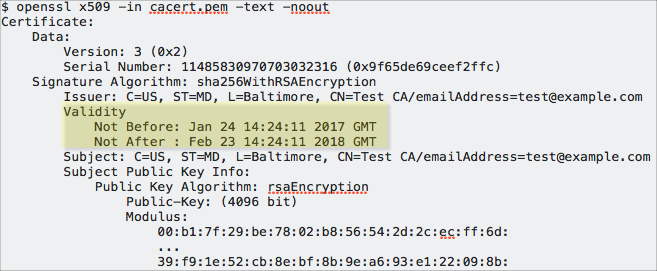Encrypting Data in Transit
How to configure TLS/SSL encryption in Cloudera Manager.
Transport Layer Security (TLS) 1.2 is an industry standard set of cryptographic protocols for securing communications over a network. TLS evolved from Secure Sockets Layer (SSL). Because the SSL terminology is still widely used, Cloudera software and documentation refer to TLS as TLS/SSL, but the actual protocol used is TLS. SSL is not used in Cloudera software.
In addition to TLS/SSL encryption, HDFS and HBase transfer data using remote procedure calls (RPCs). To secure this transfer, you must enable RPC encryption.
For instructions on enabling TLS/SSL and RPC encryption, see the following topics:
TLS/SSL and Its Use of Certificates
TLS/SSL provides privacy and data integrity between applications communicating over a network by encrypting the packets transmitted between endpoints (ports on a host, for example). Configuring TLS/SSL for any system typically involves creating a private key and public key for use by server and client processes to negotiate an encrypted connection at runtime. In addition, TLS/SSL can use certificates to verify the trustworthiness of keys presented during the negotiation to prevent spoofing and mitigate other potential security issues.
Setting up Cloudera clusters to use TLS/SSL requires creating private key, public key, and storing these securely in a keystore, among other tasks. Although adding a certificate to the keystore may be the last task in the process, the lead time required to obtain a certificate depends on the type of certificate you plan to use for the cluster.
Certificates Overview
| Type | Usage Note |
|---|---|
| Public CA-signed certificates | Recommended. This type of certificate is signed by a public certificate authority (CA), such as Symantec or Comodo. Public CAs are trusted third-parties whose certificates can be verified through publicly accessible chains of trust. Using this type of certificate can simplify deployment because security infrastructure, such as root CAs, are already contained in the Java JDK and its default truststore. |
| Internal CA-signed certificates | This type of certificate is signed by your organization's internal CA. Organizations using OpenSSL Certificate Authority, Microsoft Active Directory Certificate Service, or another internal CA system can use this type of certificate. |
| Self-signed certificates | Not recommended for production deployments. Self-signed certificates are acceptable for use in non-production deployments, such as for proof-of-concept setups. |
During the process of configuring TLS/SSL for the cluster, you typically obtain a
certificate for each host in the cluster, and re-use the certificate obtained in a given
format (JKS, PEM) as needed for the various services (daemon roles) supported by the host.
For information about converting formats, see How to Convert File Encodings (DER, JKS,
PEM) for TLS/SSL Certificates and Keys
. As an alternative to creating discrete
certificates for each host in the cluster, Cloudera cluster components support wildcard
domains and SubjectAlternateName certificates.
Wildcard Domain Certificates and SAN Certificates Support
Cloudera Manager and CDP support the use of wildcard domain certificates and SAN certificates.
A wildcard certificate—a certificate with the common name
*, as in *.example.com,
rather than a specific host name—can be used for any number of first
level sub-domains within a single domain name. For example, a wildcard
certificate can be used with host-1.example.com,
host-2.example,
host-3.example.com, and so on.
| Wildcard Certificates | Wildcard certificates can be used by all hosts within a given domain. Using wildcard certificates for all hosts in the cluster can reduce costs but also exposes greater potential risk. |
| SubjectAlternativeName Certificates | SubjectAlternativeName (SAN) certificates are bound to a set of specific DNS names. A single SAN certificate can be used for all hosts or a subset of hosts in the cluster. SAN certificates are used in Cloudera Manager high-availability (HA) configurations. |
Renew Certificates Before Expiration Dates
The signed certificates you obtain from a public CA (or those you obtain from an internal CA) have an expiration date, such as that shown in this excerpt:

Expired certificates cause most cluster operations to fail. Cloudera Manager Agent hosts, for example, will not be able to validate the Cloudera Manager Server host and will fail to launch the cluster nodes. Administrators should note expiration dates of all certificates when they deploy the certificates to the cluster nodes and setup reminders to allow enough time to renew.
